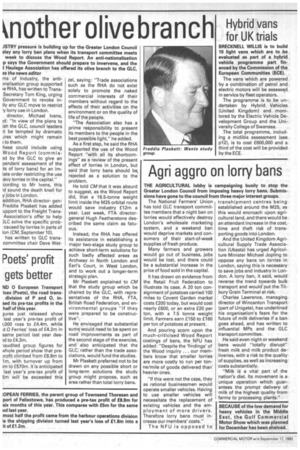knotherolivebranch
Page 6

If you've noticed an error in this article please click here to report it so we can fix it.
JSTRY pressure is building up for the Greater London Council elay any lorry ban plans when its transport committee meets week to discuss the Wood Report. An anti-nationalisation lp says the Government should prepare to invervene, and the Haulage Association has offered its olive branch to the GLC, es the news editor ms of Industry, the antimalisation group supported ie RHA, has written to TransSecretary Tom King, urging Government to revoke inHy any GLC move to restrict I/ lorry use in London.
director, Michael Ivens, id: "In view of the plans to ish the GLC, council leaders it be tempted by dramatic Jres which might remain ito them.
hese could include using Wood Report (corn misDcl by the GLC to give an pendent assessment of the ts of lorry bans) for an imiate order restricting the use !avy lorries in the capital." cording to Mr Ivens, this Id sound the death knell for y jobs in London.
addition, RHA directorgenFreddie Plaskett has added upport to the Freight TransAssociation's offer to help 3LC solve the specific probcaused by lorries in parts of Ion (CM,. September 10).
has written to GLC transcommittee chair Dave Wet zel, saying: "Trade associations such as the RHA do not exist solely to promote the naked commercial interests of their members without regard to the effects of their activities on the environment or on the quality of life of the people.
"The Association also has a prime responsibility to present its members to the people in the best possible light," he added.
As a first step, he said the RHA supported the use of the Wood Report "with all its shortcomings" as a review of the present effect of lorries in _London, but said that lorry bans should be, rejected as a solution to the problem.
He told CM that it was absurd to suggest, as the Wood Report did, that a 16.5-tonne weight limit inside the M25 orbital route would save industry £12m a year. Last week, FTA directorgeneral Hugh Featherstone described the same claim as fatuous.
Instead, the RHA has offered its assistance in establishing a major two-stage study group to achieve short-term solutions for such badly affected areas as Archway in North London and Earl's Court, in West London, and to work out a longer-term strategic plan.
Mr Plaskett explained to CM that the study group which be chaired by the GLC, with representatives of the RHA, FTA, British Road Federation, and environmental groups "if they were prepared to be constructive".
He envisaged that substantial sums would need to be spent on road improvements as part of the second stage of the exercise, and also anticipated that the GLC, rather than the trade associations, would fund the studies.
Mr Plaskett preferred not to be drawn on any possible short or long-term solutions the study group might propose, such as area rather than total lorry bans.
































































































